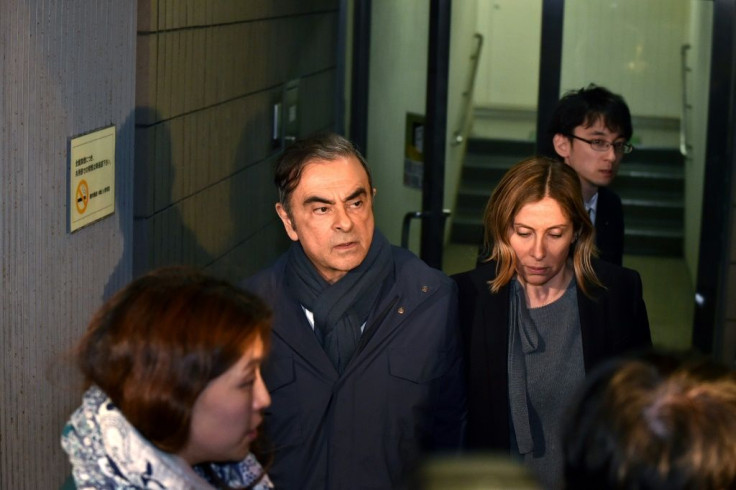Carlos Ghosn: The Charges Against Him

Former Nissan chief Carlos Ghosn jumped bail and fled Japan last month for Lebanon to avoid trial on four charges of financial misconduct, all of which he denies.
He argues he would not have received a fair trial in Japan, and claims the allegations against him are a "plot" by those opposed to greater integration between Nissan and French partner Renault.
Here are the charges Japanese prosecutors levelled against him and Ghosn's responses:
The first and second charges against Ghosn allege that he and his right-hand man at Nissan, Greg Kelly, under-reported his compensation in financial documents for at least eight fiscal years to the tune of 9.23 billion yen ($85 million).
There are two separate charges, one for the period 2010-2015 and another from 2015 to 2018. Kelly faces trial himself and is in Japan out on bail.
Authorities allege the scheme involved deferring some of Ghosn's compensation until his retirement -- possibly to avoid criticism over his hefty pay -- and that failure to declare that in official documents to shareholders constitutes financial misconduct.
Ghosn has said the payments were still in the draft stage and the proposals for post-retirement compensation were "reviewed by internal and external lawyers, showing I had no intent to violate the law".
Nissan put the full amount as a charge in its accounts after the scandal emerged.
On January 10, 2019, Ghosn was hit with a third, more serious, charge of aggravated breach of trust.
He was accused of trying to get Nissan to cover around 1.85 billion yen in personal foreign exchange losses during the 2008 financial crisis when the value of the safe-haven yen soared and his Nissan stock plummeted.
Prosecutors allege that when Ghosn failed to get Nissan to shoulder the losses, he had a Saudi business acquaintance put up the additional collateral demanded by the bank holding the contracts.
He is then accused of having transferred $14.7 million in Nissan money from his "CEO reserve" fund to the associate to compensate him for the collateral.
Ghosn said the money transferred to the Saudi associate, whom he named as Khaled Juffali, was for work he had done for Nissan, describing him as a "long-time supporter and partner" of the firm.
A statement issued on behalf of Juffali's company by a PR firm also defended the money as payments for "legitimate business purposes".
The fourth charge is for allegedly transferring millions in Nissan funds to a dealership in Oman, from which the executive supposedly skimmed off $5 million for his personal ends.
According to sources close to the case, part of the money was used for investments by a company controlled by his son and other funds channelled to a firm run by his wife to go towards the purchase of a luxury yacht.
Ghosn's wife Carole was questioned in relation to the charges against him in April, and on January 7, 2020, prosecutors obtained an arrest warrant alleging that she lied in that testimony. Both Carole and Carlos Ghosn are currently in Lebanon.
Renault in France has also handed documents to authorities apparently showing similar financial misconduct amounting to millions of euros.
Nissan, which began its own internal investigation in summer 2018 after a whistleblower came forward, has made several further allegations that have not yet resulted in formal charges.
Among them are accusations that Ghosn used a subsidiary purportedly set up to help fund Nissan's tech investments to pay for personal residences in Rio de Janeiro, Beirut and Paris.
Nissan also believes Ghosn was paying his sister up to $110,000 a year between 2003-2016 for a fictitious role as an adviser.
Asked about these allegations by AFP, Ghosn complained there was an "army" of Nissan investigators against him and denied any wrongdoing.
In France, authorities are also investigating the hiring -- thought to be worth 50,000 euros -- of the sumptuous Palace of Versailles for his 2016 wedding.
© Copyright AFP 2024. All rights reserved.





















